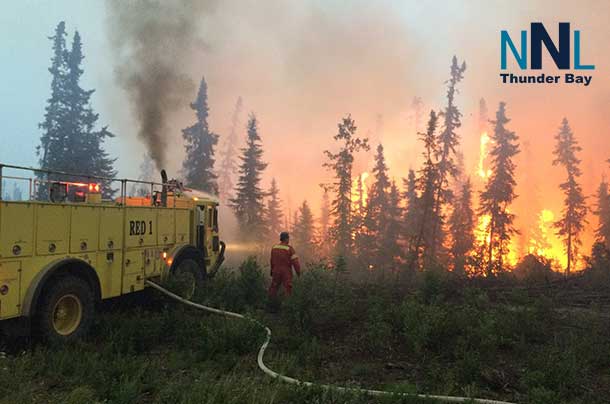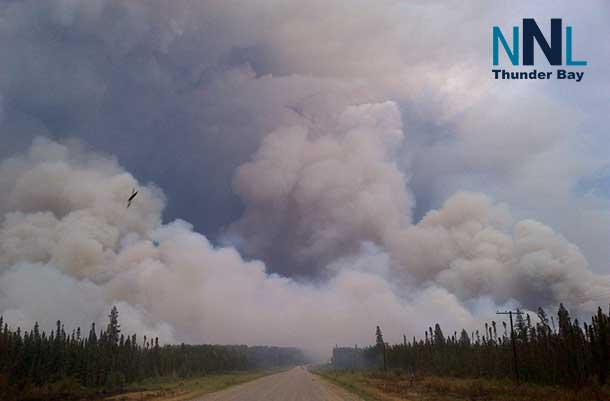
Saskatchewan Deployment for Ontario Fire Fighters Continues
THUNDER BAY – WILD FIRE Update – There were no new fires by the evening of July 6 in the Northwest Region. The Air Quality Advisory issued by Environment Canada has ended. A strong wind from the north into Thunder Bay has helped clear out the smoke that generated that advisory. At 21:00hr EDT, winds were NNW 25 km/h gust 37 km/h.
Over the coming days it is likely we may see more smoke into the region from wild fire activity in Saskatchewan. Right now across Northern Manitoba there are air quality advisories in effect.
There are 49 active fires in the Northwestern Ontario region. Two are not under control, five are under control and the remaining 42 fires are being observed.
The forest fire hazard is forecast to be low in the west and moderate in the eastern sectors.
Out of Province Deployment
Ontario is supporting firefighting efforts with 219 fire management personnel to the following provinces and territories. Alberta (80), Saskatchewan (43), Parks Canada- Saskatchewan(8), the Northwest Territories(84), Manitoba (2) and the Yukon (2).
Saskatchewan Wild Fire Update
The wild fires in Saskatchewan have caused a number of northern communities to be evacuated.

Assembly of First Nations (AFN) National Chief Perry Bellegarde called for action to ensure safety and security for all First Nations citizens and communities affected by the fire situation in Saskatchewan.
Montreal Lake Cree Nation declared a state of emergency earlier today. Lac La Ronge Indian Band, the largest First Nation in Saskatchewan, is currently undergoing evacuation. Thousands of people are affected by the forest fire situation. The province is providing updates as the situation develops.
“Our thoughts are with all those who are affected by the forest fires in Saskatchewan, including the many men, women and children who have had to be evacuated to other communities,” said National Chief Bellegarde. “We must make sure they have proper food, water and shelter during this difficult time. I have been in touch with Saskatchewan Minister of Government Relations Jim Reiter to support the calls for immediate action from all levels of government, including the federal government. I am in touch as well with Chiefs in the region, including Montreal Lake Cree Nation Chief Henderson and Lac La Ronge Chief Cook-Searson. We are all working to ensure the response is immediate and co-ordinated so our citizens are safe. We will continue to monitor the situation and provide any support we can.”
Liberal Party leader Justin Trudeau, issued the following statement about the ongoing wildfires in Northern Saskatchewan: “The devastating and ongoing wildfires in Northern Saskatchewan deserve national attention. The hearts of all Canadians go out to those who are suffering, particularly the thousands of people who have been forced to leave their homes.
“I am pleased that the Canadian Armed Forces are now being called in to assist with the situation. The Canadian Red Cross is also present and doing an excellent job of helping those currently affected.
“Yesterday, the Rt. Hon. Paul Martin and my Deputy Leader, Ralph Goodale, were in the region meeting with First Nations Chiefs and offering encouragement to displaced evacuees. Today, I spoke with the Mayor of La Ronge and the Prince Albert Grand Council emergency measures committee and offered my support.
“Federal and provincial authorities will need to maintain open communication with communities and Aboriginal leaders to ensure the best possible response. Canadians will want to respond with concern and generosity, and every effort must be made to care for the thousands who have been affected.”
There are seven aviation personnel in Alberta to provide air attack with two CL-415 heavy water bombers and one bird dog aircraft.
Ontario is providing equipment including fire hose, sprinkler kits, pumps and chainsaws to Alberta, British Columbia, Parks Canada and Saskatchewan.
The Aviation, Forest Fire and Emergency Services program is reminding people that they are responsible for safe outdoor fire management and must follow guidelines set out in the Forest Fires Prevention Act of Ontario including no day burning of brush or grass fires. Campfires are to be tended at all times and put out before leaving.
For further tips on how to be FireSmart, visit ontario.ca/firesmart. The Northwest Region Fire Information Hotline is available for general information updates – 1-888-258-8842. Report forest fires by calling 310-FIRE (3473).
